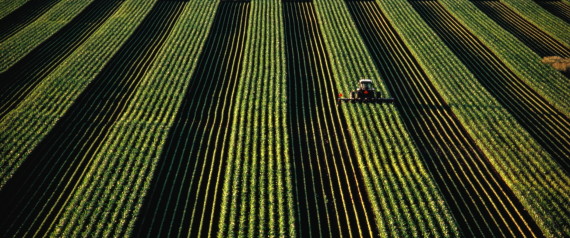ROME, Dec 18 (Thomson Reuters Foundation) - Global warming could cause an 18 percent drop in world food production by 2050, but investments in irrigation and infrastructure, and moving food output to different regions, could reduce the loss, a study published on Thursday said.
Globally, irrigation systems should be expanded by more than 25 percent to cope with changing rainfall patterns, the study published in the journal Environmental Research Letters said.
Where they should be expanded is difficult to model because of competing scenarios on how rainfall will change, so the majority of irrigation investments should be made after 2030, the study said.
"If you don't carefully plan (where to spend resources), you will get adaptation wrong," David Leclere, one of the study's authors, told the Thomson Reuters Foundation.
Infrastructure and processing chains will need to be built in areas where there was little agriculture before in order to expand production, he said.
International food markets will require closer integration to respond to global warming, as production will become more difficult in some southern regions, but new land further north will become available for growing crops.
Based on the study's models, Leclere expects production to increase in Europe, while much of Africa will remain dependent on imports.
If climate change is managed correctly, food production could even rise 3 percent by 2050, the study said, as a higher concentration of carbon dioxide in the atmosphere has a fertilizing effect on plants.
Managing water resources is expected to be the biggest challenge for farmers steming from climate change.
Water "may become dramatically scarcer much earlier than previously thought," Michael Obersteiner, another study co-author, said in a statement. (Reporting By Chris Arsenault; Editing by Tim Pearce)
Original Article
Source: huffingtonpost.com/
Author: Chris Arsenault
Globally, irrigation systems should be expanded by more than 25 percent to cope with changing rainfall patterns, the study published in the journal Environmental Research Letters said.
Where they should be expanded is difficult to model because of competing scenarios on how rainfall will change, so the majority of irrigation investments should be made after 2030, the study said.
"If you don't carefully plan (where to spend resources), you will get adaptation wrong," David Leclere, one of the study's authors, told the Thomson Reuters Foundation.
Infrastructure and processing chains will need to be built in areas where there was little agriculture before in order to expand production, he said.
International food markets will require closer integration to respond to global warming, as production will become more difficult in some southern regions, but new land further north will become available for growing crops.
Based on the study's models, Leclere expects production to increase in Europe, while much of Africa will remain dependent on imports.
If climate change is managed correctly, food production could even rise 3 percent by 2050, the study said, as a higher concentration of carbon dioxide in the atmosphere has a fertilizing effect on plants.
Managing water resources is expected to be the biggest challenge for farmers steming from climate change.
Water "may become dramatically scarcer much earlier than previously thought," Michael Obersteiner, another study co-author, said in a statement. (Reporting By Chris Arsenault; Editing by Tim Pearce)
Original Article
Source: huffingtonpost.com/
Author: Chris Arsenault

No comments:
Post a Comment